Nigeria’s inflation rose to 34.60 per cent in November 2024, reflecting a 0.72 per cent increase from October’s rate of 33.88 per cent.
This came as Nigerians expressed optimism that the level of inflation across the country would decelerate in the next six months
This was one of the outcomes of the Inflation Expectations Survey Report for November published by the Statistics Department of the Economic Policy Directorate of the Central Bank of Nigeria.
The Consumer Price Index report released by the National Bureau of Statistics on Monday indicated that the country’s latest inflation rate marked a significant year-on-year rise, with the November 2024 rate being 6.40 percentage points higher than the 28.20 per cent recorded in November 2023.
The report read in part, “In November 2024, the headline inflation rate was 34.60 per cent relative to the October 2024 headline inflation rate of 33.88 per cent. Looking at the movement, the November 2024 headline inflation rate showed an increase of 0.72 percentage points compared to the October 2024 headline inflation rate.
“On a year-on-year basis, the headline inflation rate was 6.40 percentage points higher than the rate recorded in November 2023 (28.20 per cent). This shows that the headline inflation rate (year-on-year basis) increased in November 2024 compared to the same month in the preceding year (i.e., November 2023).”
The rise in inflation is largely driven by food price increases, which continue to place a strain on Nigerian households. On a month-on-month basis, the headline inflation rate showed a marginal slowdown, standing at 2.638 per cent in November compared to 2.640 per cent in October.
While inflation remains high, this slight dip indicates a slower pace of price increases than the previous month.
However, the year-on-year increase still highlights the ongoing pressure on consumers, with the cost of living continuing to climb.
Food inflation has also seen a sharp rise, reaching 39.93 per cent in November 2024, up from 32.84 per cent in the same period last year. Prices for staple foods such as yam, rice, maize, and palm oil have surged, contributing to the increase in food inflation.
Other items such as guinea corn, millet, and meat have also seen notable price hikes.
![]()










